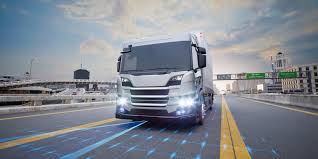When I think about the way industries are changing, logistics stands out as one of the most exciting spaces to watch. The rise of autonomous trucks is not just an idea—it’s becoming a practical reality. These trucks are being designed to move goods with efficiency, reliability, and precision. For me, it’s fascinating to see how technology is transforming transportation in ways that once seemed impossible.
Why Autonomous Trucks Matter
The logistics industry has always been about speed, safety, and efficiency. Traditional trucking requires long hours, constant focus, and detailed planning. With autonomous trucks, much of this responsibility shifts to advanced systems that can handle navigation, road conditions, and delivery schedules with consistency.
I’ve noticed that the push toward autonomous trucking is driven by a few important factors:
- Growing demand for fast deliveries: Online shopping continues to increase, creating pressure on logistics systems.
- Driver shortages: Autonomous trucks can help fill the gaps where human drivers are limited.
- Improved safety: Machines don’t get tired, so long-distance trips can be managed more reliably.
- Fuel efficiency: Smart systems optimize driving patterns to save energy and reduce costs.
For me, these reasons make it clear why autonomous trucks are becoming a key part of logistics. It’s not just about replacing traditional methods—it’s about creating an upgraded system that can handle modern challenges.
How Autonomous Trucks Work
Autonomous trucks are powered by a combination of sensors, cameras, radar, and artificial intelligence. These technologies work together to create a 360-degree view of the road. The trucks can make decisions in real time, adjusting to traffic, weather, and unexpected situations.
The systems are designed to follow traffic rules, maintain safe distances, and even manage lane changes smoothly. What I find impressive is how much data these trucks process every second to ensure safe and efficient movement. It’s like having a driver who never loses focus.
Some of the technologies that make this possible include:
- LiDAR and radar sensors for detecting obstacles and road conditions
- GPS systems for precise navigation
- AI-powered algorithms for decision-making
- Connectivity tools for real-time communication with logistics centers
By blending these technologies, autonomous trucks can operate consistently, reducing delays and improving delivery schedules.
Benefits of Autonomous Trucks in Logistics
From what I see, autonomous trucks offer benefits that extend beyond just faster deliveries. The impact spreads across businesses, customers, and the overall industry.
Some of the most significant benefits include:
- Reduced delivery times: Trucks can operate for longer hours without breaks.
- Lower costs: Improved fuel efficiency and reduced labor shortages help companies save money.
- Sustainability: Optimized driving reduces fuel consumption and emissions.
- Better reliability: Advanced systems reduce errors caused by fatigue or distraction.
The potential here is not just about logistics companies—it’s about creating an ecosystem where customers get what they need faster and more reliably. I believe that as more businesses adopt autonomous trucking, the industry will evolve into a smoother, smarter network.
The Future Outlook
I see autonomous trucks becoming more common on highways and in logistics hubs over the next few years. Companies are already testing fleets, and the results show strong potential. What excites me most is the possibility of creating a connected system where autonomous trucks, warehouses, and supply chain platforms work together seamlessly.
For me, it’s like choosing between different options at a Vape shop—each innovation adds variety, but the goal is the same: a better experience. The logistics industry is moving toward efficiency, and autonomous trucks are leading that change.
As I continue to follow these developments, I imagine a time when highways are filled with autonomous fleets that deliver goods faster than ever before. Just like I sometimes search for Custard Monster Vape Flavors Near Me to find exactly what I want, businesses will rely on autonomous trucks to deliver products with the same level of precision.
The future of logistics is not only about machines—it’s about how these machines enhance human progress. I know that when I see technology blending into daily life, it always comes down to balance. Autonomous trucks bring that balance by combining safety, speed, and reliability.
In the long run, the role of autonomous trucks will go beyond logistics. They will shape supply chains, influence trade, and redefine the way industries work together. And just as I enjoy exploring Custard Monster Flavors to try something new, I believe companies and individuals will embrace autonomous trucking as a refreshing change that improves how goods move across the world.
Final Thoughts
When I reflect on the logistics industry, I see autonomous trucks as one of the most transformative innovations of our time. They are not replacing the past—they are building the future. With technology evolving quickly, I’m confident that autonomous trucking will soon be a standard part of the way businesses deliver products.
It feels inspiring to know that we’re stepping into a future where goods arrive faster, industries work smarter, and the road ahead is shaped by innovation. Autonomous trucks are not just vehicles—they represent a movement toward progress, and I’m glad to see it happening right before my eyes.

